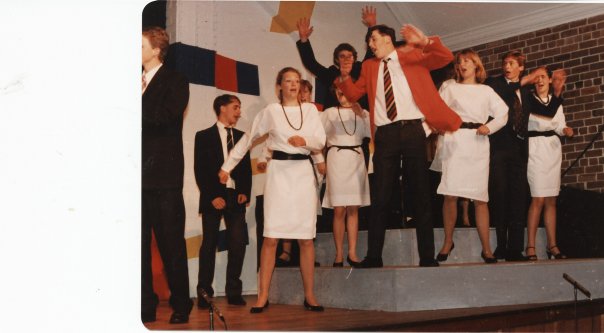Andrew Irvine: Cultural leader, theologian, predecessor to the stars

Photo Courtesy of Andrew Irvine.
Most students on campus know Dr. Andrew Irvine, associate professor of philosophy and religion, for any of number reasons: his endearing accent, his jovial nature or the sincere fervor with which he approaches his classes. Rarely a day passes on campus without the flash of his bright smile and customary wave. However, many students probably believe the man’s allure and mystery stop there; however, these traits are only the beginnings of a greater story.
Irvine began his incredible life as a farm boy outside the hustle and hubbub of urban Australia. His penchant for learning led Irvine to Knox Grammar School in Sydney, a preparatory school where a young Irvine began to hit his stride as both a scholar and a leader. There, Irvine would begin leaving his formidable impression on the world around him. At Knox, Irvine was given his first opportunity to step into the limelight. Taking an interest in theater and drama, Irvine won the role of Tackaberry in the school’s production of “How to Succeed in Business Without Really Trying.”
Even then Irvine acted as a mentor. Who can say if it was the masterful reprisal of the role, the magnanimous glow of his personality or the fervor with which he attacked all areas of life that led him to influence his greatest protégé? All that is known, is that Irvine, strong and confident, could hardly help but become an idol of sorts to a small, unassuming boy standing in the chorus. This boy, a young Australian dreaming of the silver stage, was none other than Hugh Jackman.
A young, somewhat scrawny Jackman attended Knox with Irvine, who was a few years older. While talented, Jackman’s musical ability must have paled in comparison to the older, energetic Irvine, whose energy and charm left no room to share the spotlight. Always humble, Irvine does not attribute too much significance to this occurrence.
“I think Jackman must have seen me and thought ‘I wanna be like Irvine’” Irvine said, following the only logical conclusion.
Of his many accomplishments since his days at Knox, Irvine remains proud of the legacy passed on to his young successor. The gauntlet given over, he continued to participate in theater throughout his collegiate and professional career to a lesser extent. Though, on the whole, he chose to leave the work of entertainment to his protégé, following instead the path of an educator and world-conscience theologian in his professional life.
Irvine went on to study English at Sydney University and, from there, landed a job organizing philanthropic events with Educational and Promotion Unit of the National Council of Churches in Australia. This job nourished Irvine’s interest in theology and world cultures.
Irvine continued on to complete graduate work in theology at Boston University, which led him to one of the most formative parts of his career, the opportunity to lead a study abroad program in comparative religion to Taiwan, Thailand, India, Turkey, Italy, Greece and China, among other nations. Irvine said he found the experience truly enlightening particularly when it came to teaching; he was left with a strong impression about the ways in which to teach others about understanding and comprehending cultures different from their own. Irvine said he believed that this knowledge could be applied to his religious studies and other academic fields. Today, this can be seen as a clear focus in his religious courses here at Maryville College, where the appreciation of different religious beliefs is approached through the unbiased understanding of them.
Despite the drastic shift that occurred in Irvine’s career, the call of the theater never truly left him.
Now, having found success in the fields of academia and theology, he can look back on his earlier love of theatre with satisfaction, knowing that at one time, he was more important in a musical than an award-winning Broadway actor. And, though his passion for theater never led to anything substantial, his experience with it is one he will never forget.
